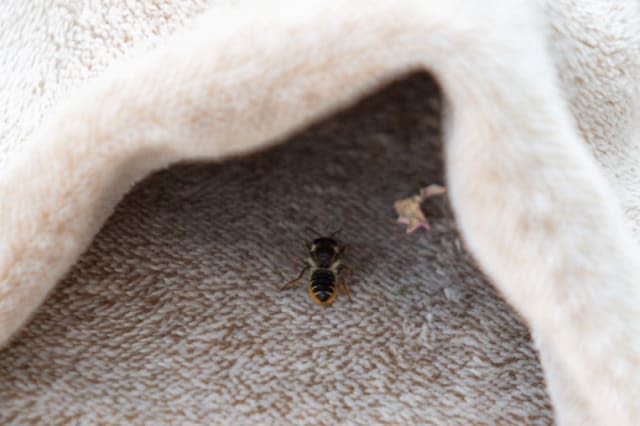UK's bee population is under threat after family discovering rare petal-loving bee in luggage

Britain's bee population is under threat after a family accidentally brought back a rare non-native species in their luggage from Turkey - which started making a nest on their SOFA.
The Toy family reckon a mason bee or a larvae - only found in Turkey and Iran - made its way into their suitcases while they were on holiday.
They only discovered the apparent stowaway when dad Ashley Toy, 49, found a beautifully constructed and unusual petal cocoon on the sofa in their Bristol home.
Daughter Amelia, 19, did some research, and discovered the osmia avosetta is only found in Turkey and Iran.But once the British Beekeepers Association found out, the experts notified the UK's experts and Defra.
The association said the non-native queen could have a "devastating effect" on British bees - and the National Bee Unit (NBU) and DEFRA are now on the case.
Meanwhile, the bee is happily constructing numerous beautiful cocoons in the family's conservatory in Bristol, 1,800 miles from home.

It is thought it's the first time this type of mason bee - osmia avosetta - has been spotted in the UK.It was only discovered for the first time by a team in Turkey in 2009 - oddly enough the same day another team discovered the same bee and flowery nests in Iran.
Amelia, 19, said: "They've [NBU] said it could be a threat and they need to see a photo and see if it's the bee that's not supposed to be here.
"It's a bit crazy. "I can only think, if it's not ever seen in the UK, that my family must have brought an egg back or something, from Turkey.
"Obviously my family had no idea they were bringing back. Obviously now it seems like they must have."I guess if Defra are involved it must be a pretty big deal.
"They haven't advised me to capture it yet. It's there now, flying in and out with the petals."I'm completely baffled.
"Ashley, a consultant engineer, wife Louise, 47, a secretary, and son Joshua, 15, came back from a break in Dalaman, Turkey, around a week ago.He found a cocoon of petals on the sofa conservatory, but not aware it was a bee nest belonging to a bee never before seen in the UK, he threw it away.

Amelia spotted an unusual bee buzzing outside the next morning, on Monday, and opened the back door to let it in.It started making another bright nest on the same spot in their Bristol home.
Ever since, every morning they open the back door and watch in wonder as the insect flies in and out all day with petals from their hydrangea, creating intricate nests.
So far it has created at least two more cocoons on a cosy blanket on the sofa in their conservatory."It was bringing in these petals and creating little cocoons or little petals," she said.
"It was really strange.
"Every morning it comes in when we open the door.
"The in goes in and out, in and out.
"I've never seen anything like it before.
"I'm fascinated by it.
"It goes really quick. It's so smart.
"It flies out, it's gone for literally ten seconds in the garden, and then brings a petal in."
The British Beekeepers Association found out on Wednesday when it was asked for clarity on whether the bee had been correctly identified. A spokeswoman for the British Beekeepers Association told them to urgently capture the bee, send a photo to the National Bee Unit, and alerted Defra.

The National Bee Unit then made contact with Amelia, and is currently working on a strategy.The Bumblebee Conservation Trust said it was not aware of osmia avosetta ever being seen in the UK before.
The charity's science manager said the cocoon did look like one made by the rare Turkish bee.
They advised they believe it would be considered illegal to release a non-native species into the wild in the UK.
A spokeswoman for the British Beekeepers Association said the bee was only found in Turkey and Iran, and it could have a "devastating effect" on native mason bees.
She said: "Non native species like this bee pose several problems and need to be controlled. "They may carry viruses that will wipe out native species or they may simply out-compete similar species for food sources."



